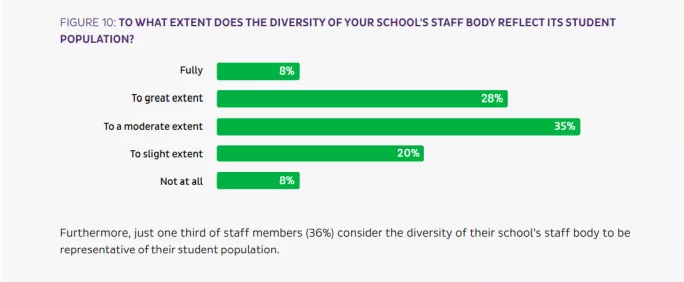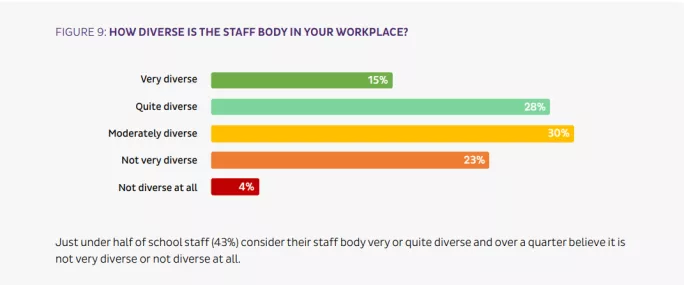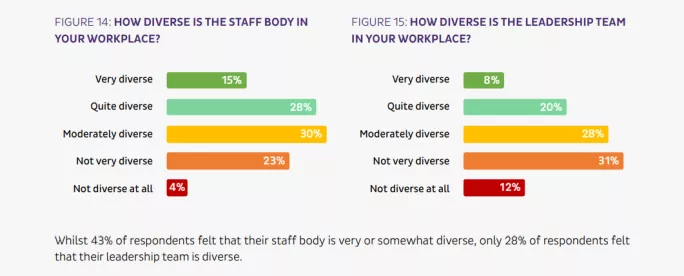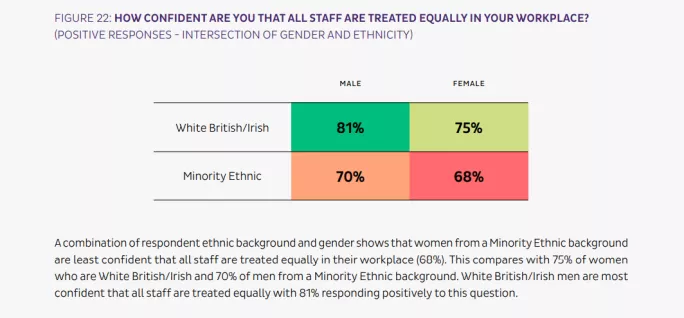1/3 of teachers say staff diversity reflects pupils’

A new report on inclusion and diversity in schools has revealed that only a third of staff feel that the diversity of the workforce in their school is representative of their pupil population.
In the report - Equality, Diversity and Inclusion Among School Staff - from survey management site Edurio, just 36 per cent of more than 16,500 respondents in 381 schools in England said their staff body reflected the backgrounds of pupils at their school.

Almost half (47 per cent) of respondents in urban areas such as London and the West Midlands believe their school to be diverse, compared to a quarter (24 per cent) of those in rural areas.
Diversity in FE: How to make aspirations a reality
News: Diversifying leadership will improve college finances
Tes magazine: What FE colleges can do to improve diversity
“Very white, middle-class staff,” one respondent commented.
“No openly LGBTQ+ staff, minimal staff of colour and not in senior roles,” they added.
The report also found that less than half of school staff - 43 per cent - felt that their workplace was diverse, with less than three-quarters (69 per cent) of staff from ethnic minority backgrounds feeling that their workplace was committed to equality, diversity and inclusion compared with 83 per cent of white British/Irish staff.

The study also found that leadership teams were seen as being less diverse than the wider staff body, with less than a third of respondents - 28 per cent - reporting that they believed their leadership team was diverse.

And almost nine in ten - 88 per cent - of respondents in leadership positions are confident that all staff are treated equally, compared with 70 per cent of those who do not hold a leadership position.
One respondent described a “cliquey feel of leadership team”, adding “friendships outside of school can impact how you are treated”.
Another said: “Very don’t ask don’t tell re: LGBTQ+ staff members. No explicit support or network compared to many schools. This also extends to students.”
It found that women from ethnic minority backgrounds are least confident that all staff are treated equally in their workplace, with 68 per cent of women from BAME backgrounds feeling confident in this compared with 81 per cent of white British/Irish male respondents.

And 58 per cent of disabled women felt valued in their workplace, in comparison with 75 per cent of non-disabled men.
In total, 55 per cent of disabled staff members from an ethnic minority background felt valued in the workplace compared with 73 per cent of non-disabled White staff.
The report also found that a higher proportion (65 per cent) of men feel confident that decisions around promotion are made without bias at their school, with this falling to just over half (57 per cent) of women.
Two-thirds (64 per cent) of men said they are confident that their career is advancing in alignment with their personal needs and responsibilities compared to only 58 per cent of women.
Ernest Jenavs, chief executive of Edurio said: “The last year has highlighted the magnitude of global challenges around EDI.
“The diverse backgrounds and identities of employees in education should have no adverse effect on their experience but we still have some way to go to get there.
“Many school and trust leaders have stepped up to better understand the challenges. We have looked deeper into EDI among school staff across England than has ever been done before.”
Other findings from the research include:
- Four in 10 staff (43 per cent) are not confident that decisions on promotions are made without bias. And just 45 per cent of disabled staff felt confident that decisions around promotion are made without bias compared to 60 per cent of non-disabled staff.
- 62 per cent of disabled staff feel confident that all staff are treated equally compared with non-disabled staff, of whom 75 per cent feel confident that all staff are treated equally.
- 71 per cent of LGBTQ+ staff feel confident all staff are treated equally compared with 75 per cent of heterosexual staff.
- Nearly two-thirds of respondents - 65 per cent - who selected a religion other than Christianity, said they feel very or quite valued in their workplace compared with those who selected Christianity (73 per cent) and those who identify as agnostic or atheist (71 per cent).
- A small proportion reported that they had often experienced comments, jokes or behaviour they perceived as offensive - just 3 per cent of all staff surveyed. However, this tripled to 9 per cent for disabled staff.
Hannah Wilson, co-founder of #DiverseEd, said: “We are one of the many grassroots communities who are passionate about diversity, equity and inclusion; who create events, training opportunities and spaces for meaningful conversations.
“We want and need: more diverse teachers to be attracted, recruited and retained; more diversity in the make-up of leadership teams and governing bodies; more representation in the curriculum; more inclusive policies and practices to create a sense of belonging for all.”
Ruth Golding, founder of DisabilityEd, said: “This research reflects what we pick up through the DisabilityEd UK network.
“The data around feeling valued, and some colleagues’ jokes or comments to them reflects an ableist environment that many experience. I founded DisabilityEd to raise awareness of how to make education accessible by supporting disabled educators to get the reasonable adjustments that they need. This research highlights how far there is still to go.”
You need a Tes subscription to read this article
Subscribe now to read this article and get other subscriber-only content:
- Unlimited access to all Tes magazine content
- Exclusive subscriber-only stories
- Award-winning email newsletters
Already a subscriber? Log in
You need a subscription to read this article
Subscribe now to read this article and get other subscriber-only content, including:
- Unlimited access to all Tes magazine content
- Exclusive subscriber-only stories
- Award-winning email newsletters



